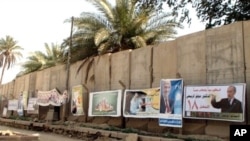There is no clear frontrunner among the parties competing in Iraq's parliamentary elections Sunday. Private polling data is considered unreliable, as different surveys show different parties coming out on top. No matter who wins, they will likely need to ally with other parties to form a government.
More than 6000 candidates are running for a seat in Iraq's 325-member parliament. And the candidates, and their parties are offering a variety of visions of the direction they'd take the country.
While Iraq is moving more closely to nationalist politics, sectarian identity is still very much part of the mix. There are three major Shi'ite-led coalitions, including that of incumbent Prime Minister Nouri al-Maliki. His State of Law Coalition includes several small Sunni groups, and is positioning itself as the choice of pragmatists.
Mr. Maliki says Iraq's future depends on respect for the rule of law, and making sure proper systems and establishments are in place.
It's an appealing idea for many voters, but the prime minister's record of failing to rein in violence during his term has weakened his support.
Competing with Mr. Maliki for the centrist position is Iraqiya, a bloc led by former prime minister and secular Shi'ite Ayad Allawi. Mr. Allawi is appealing for a broad partnership among Sunnis, Shi'ites, Christians, Turkomen and Kurds. His bloc includes prominent Sunni politicians, among them Vice President Tariq al-Hashimi, and Saleh al-Mutlaq, who was shut out of taking part by a controversial ban on politicians with ties to the party of former leader Saddam Hussein.
One Shi'ite-led bloc that is playing up its sectarian profile is the Iraqi National Alliance. It's headed by the Supreme Islamic Iraqi Council, includes supporters of anti-American cleric Moqtada al-Sadr and has strong ties to Iran.
There are also other, smaller groups, like the Unity of Iraq Coalition, led by Interior Minister Jawad al-Bolani, who could make a decent showing and play an important role in any coalition building.
Jockeying after the vote is widely expected. But a more immediate concern is that, with all the major blocs able to point to surveys showing them in the lead, second and third place finishers might challenge the election results.
Early polling has gone relatively smoothly. There were some complaints that not everyone's name was properly registered, but many are attributing that to confusion rather than fraud. Election monitors from the United Nations, the Arab League and other international groups are on hand, as are some 200,000 Iraqi observers.
The U.N.'s Special Representative to Iraq, Ad Melkert stressed the importance of all Iraqis having a stake in the election. "I think it's actually the most decisive moment since 2003, the invasion that of course turned the country upside down. And now is the chance, also against the backdrop of the withdrawal of the American troops in the next few years, that Iraqis really define by themselves their own way forward, their own destiny. And the election is of course not the only thing, but it's very vital to bring all Iraqis on board of that process towards the future," he said.
Violence preceded the run-up to Sunday's election, and Iraqi security forces have stepped up their presence around the country. The government has taken the precaution of instituting curfews and is closing airports and borders in a bid to prevent further strikes.
One Day Ahead of Vote, Iraqi Electoral Race Remains Wide Open

Private polling data is considered unreliable, as different surveys show different parties coming out on top











